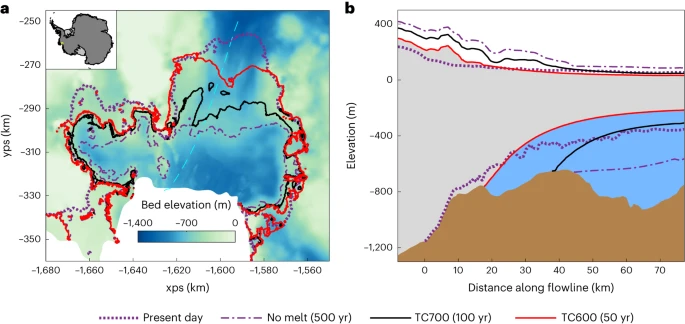Researchers discover recent irreversible retreat phase of Pine Island Glacier.
- December 5, 2023
- Posted by: Sinead Sprigg
- Category: Environmental, Global, Research Papers, Water Issues, Arctic & Antarctica

Pine Island Glacier (PIG), a significant part of the West Antarctic ice sheet, has experienced substantial changes, including acceleration, retreat, and thinning. A new study has found that PIG’s rapid retreat in the 1970s from a subglacial ridge to an upstream ice plain was self-enhancing and irreversible. The research suggests that by the early 1970s, PIG had passed a point beyond which its original position on the ridge could not be recovered, even during subsequent periods of cooler ocean conditions.
This irreversible phase concluded by the early 1990s, resulting in a retreat of almost 40 km and contributing 0.34 mm to the global mean sea level, making PIG the primary contributor from the Antarctic ice sheet during that period.
The West Antarctic ice sheet has been losing mass since the satellite era’s inception, with the Amundsen Sea Embayment experiencing thinning, accelerated ice flow, and grounding-line retreat, raising concerns about the region’s future stability. Modelling studies predict further retreat, and there is a potential for the complete collapse of the West Antarctic ice sheet if local destabilisation occurs.
Climate anomalies in the central tropical Pacific during the 1940s and 1970s are believed to have played a role, causing increased warm circumpolar deep-water access, leading to enhanced thinning.
Using a vertically integrated ice-flow model, the researchers simulate PIG’s retreat from the subglacial ridge to an upstream ice plain. The model suggests that PIG’s pre-1940s state was stable on the ridge, with temporary retreats in response to variable ocean conditions.
However, the 1940s climate anomaly, likely associated with an El Niño event, triggered a rapid retreat, facilitated by the merging of upstream cavities. The study identifies a threshold crossed by the early 1970s, marking the irreversible phase of retreat, leading to PIG’s stabilisation on a new bed high point by the early 1990s.
The research highlights the irreversible nature of PIG’s retreat and provides observational support for marine ice sheet instability, a theoretical concept suggesting that once a marine ice sheet starts retreating, it may enter a self-sustaining and irreversible phase.
Read the full study here.
